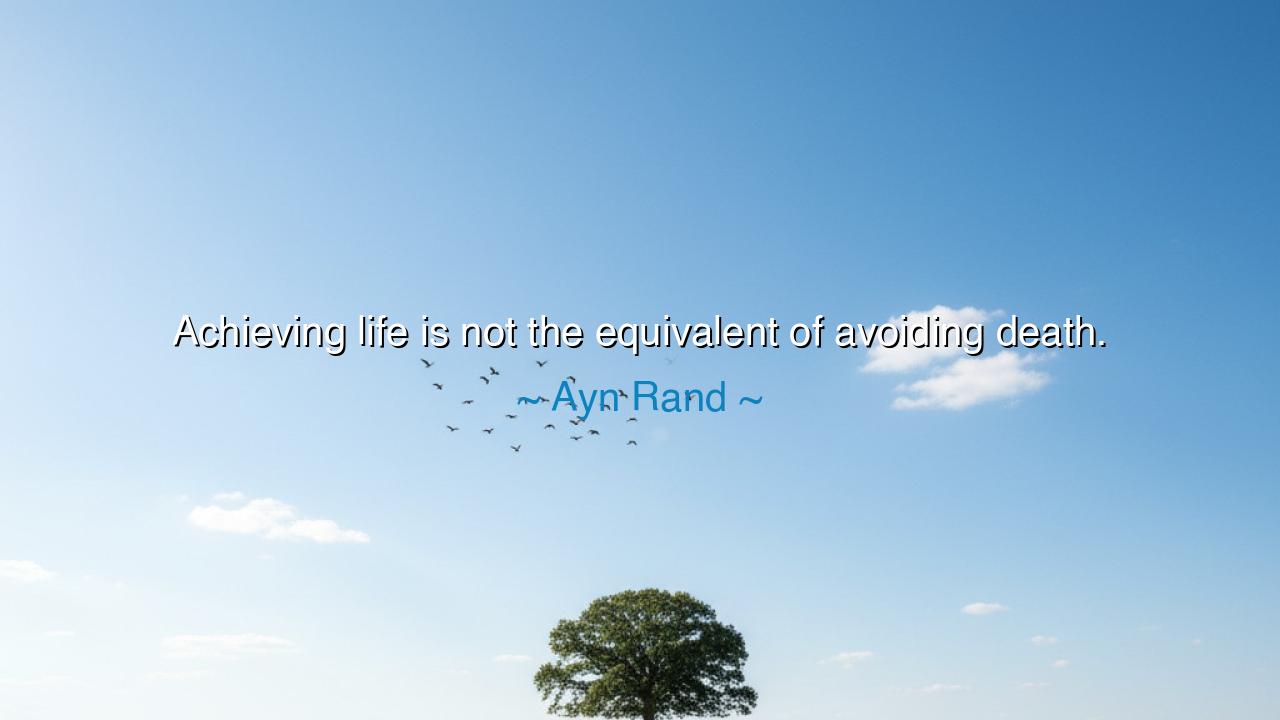
Achieving life is not the equivalent of avoiding death.






“Achieving life is not the equivalent of avoiding death.” Thus spoke Ayn Rand, the fierce philosopher of reason and individuality, whose words were forged in the fires of struggle and conviction. In this sentence, sharp as a blade and luminous as a star, she teaches that to live is more than to survive. For mere survival belongs to beasts and cowards; but to achieve life—to create, to strive, to fulfill the highest potential of one’s being—is the mark of the spirit that refuses to crawl. Life, she declares, is not a trembling escape from death—it is the proud assertion of existence.
The origin of this quote lies in the philosophy of Objectivism, the creed Ayn Rand built as both shield and sword against the nihilism of her age. Having fled the oppression of Soviet Russia, she had seen men reduced to shadows—breathing, but not living; existing, but not free. To her, such existence was a slow dying. True life, she believed, demanded more than the avoidance of death—it required the full, conscious pursuit of one’s values, one’s purpose, one’s joy. To “achieve life” was to choose vitality over fear, creation over conformity, truth over the comfort of falsehood.
To avoid death is the instinct of the body—to eat, to sleep, to endure. But to achieve life is the calling of the soul—to think, to build, to love, and to create meaning where none is given. Many men, she reminds us, walk through the world as ghosts: obedient, cautious, unfulfilled. They measure their days not by what they have built, but by what they have escaped. They survive winters, but never see spring; they count breaths, but never draw one deeply enough to taste the sweetness of being alive. Such existence is not life, but the mere postponement of death.
History is rich with examples of those who understood this truth. Consider Leonardo da Vinci, whose life was a storm of curiosity and creation. He did not live simply to avoid death—he lived to expand the boundaries of what it meant to be human. Each invention, each painting, each page of his notebooks was a declaration that existence could be magnificent. Or think of Socrates, who, facing death, refused to betray his principles. To him, life was not the cowardly prolonging of days, but the pursuit of virtue and truth. He drank the hemlock with peace in his heart, for he knew he had achieved life, even as he surrendered it.
Ayn Rand saw this same tragedy and triumph in her own time. In her novel Atlas Shrugged, the creators of the world withdraw from a civilization that demands their sacrifice, choosing not to merely avoid death, but to live freely—to build anew in accordance with reason and joy. Her heroes live not by evasion, but by assertion. They refuse to exist as cogs in a machine of fear. To her, the man who bows to nothing but truth and builds from his own strength is the living symbol of “achieved life.” The man who lives only to escape pain, to maintain safety, to follow others—is already spiritually dead.
Yet the quote is not only philosophical; it is profoundly human. It speaks to every soul that has ever shrunk from risk, from love, from creation out of fear of loss. It whispers that life begins only when fear ends—that to truly live, one must embrace uncertainty, must act, must dream, must dare. The avoidance of suffering is not joy, and the avoidance of failure is not success. To live well is to meet the world with courage, to strive toward the good even knowing the shadow of death follows behind.
The lesson, then, is clear and eternal: live not as one avoiding death, but as one achieving life. Do not waste your years in timid safety, guarding your existence as though it were a fragile possession. Spend it boldly in pursuit of what you love, for the measure of a life is not in its length, but in its fullness. Create, seek knowledge, cherish beauty, love deeply, and stand upright in the face of fear. In doing so, you will fulfill the highest command of existence—to live not merely as a survivor, but as a creator.
So, O seeker of truth, remember the wisdom of Ayn Rand: to achieve life is to affirm the power within you to shape the world, to rise above fear, to claim your own purpose beneath the eternal sky. For death will one day come to all—but only those who have lived greatly will meet it unafraid, knowing they have not merely fled the void, but filled their days with the light of meaning.






AAdministratorAdministrator
Welcome, honored guests. Please leave a comment, we will respond soon